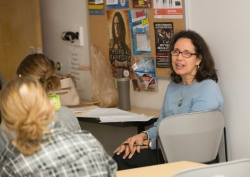
Buffalo State students go far beyond the textbook in their pursuit of careers as registered dietitians and nutritionists.
In Tina Colaizzo-Anas’s Principles of Nutrition Education course, students work with community partners to share the finer points of nutrition. Colaizzo-Anas, associate professor of health, nutrition, and dietetics, directs the college’s Dietitian Education Program.
 “At this stage of their education, students know how to study for a science test,” Colaizzo-Anas (pictured at left) said of her service-learning course, one of 105 the college is offering this year. “A service-learning project demands that students apply the principles of nutrition education in a setting that helps them truly understand the concepts they will need after graduation.”
“At this stage of their education, students know how to study for a science test,” Colaizzo-Anas (pictured at left) said of her service-learning course, one of 105 the college is offering this year. “A service-learning project demands that students apply the principles of nutrition education in a setting that helps them truly understand the concepts they will need after graduation.”
These principles include working with clients of all ages and backgrounds, overcoming language barriers, and communicating with community partners. Divided into groups of three, the students spend 30 to 40 hours conducting needs assessments and preparing presentations to deliver to seven community sites over the spring semester. The presentations began March 20 and run through April 24
At each site, students provide information in an engaging way to encourage healthier habits. This might include ideas on healthy snacks for athletic performance, nutritious cooking on a budget, understanding nutrition facts labels, or how to avoid diabetes and high blood pressure.
The community partners, which change from year to year, include three schools and a shelter for homeless and runaway teens. One partner this spring is a social service agency that serves low-income pregnant women.
“Of course, nutrition is critical for pregnancy, so working with this group is quite rewarding,” Colaizzo-Anas said. “A number of the participants don’t speak English. This is a fabulous experience for students because, in the real world, clients come from a variety of cultures speaking a number of languages.”
Upstate New York Transplant Service (UNYTS), which organizes health education in Catholic schools, is another community partner. Buffalo State students were assigned to two middle schools in conjunction with this program.
In each stage of the project, students create performance objectives and evaluation methods. Before they visit the community partners, Colaizzo-Anas approves their lesson plans and materials, as do their contacts at each community site.
“This is very labor intensive for my students but also exciting,” she said. “They always come away with a broader understanding of how to communicate nutrition information in the most effective way possible.”
